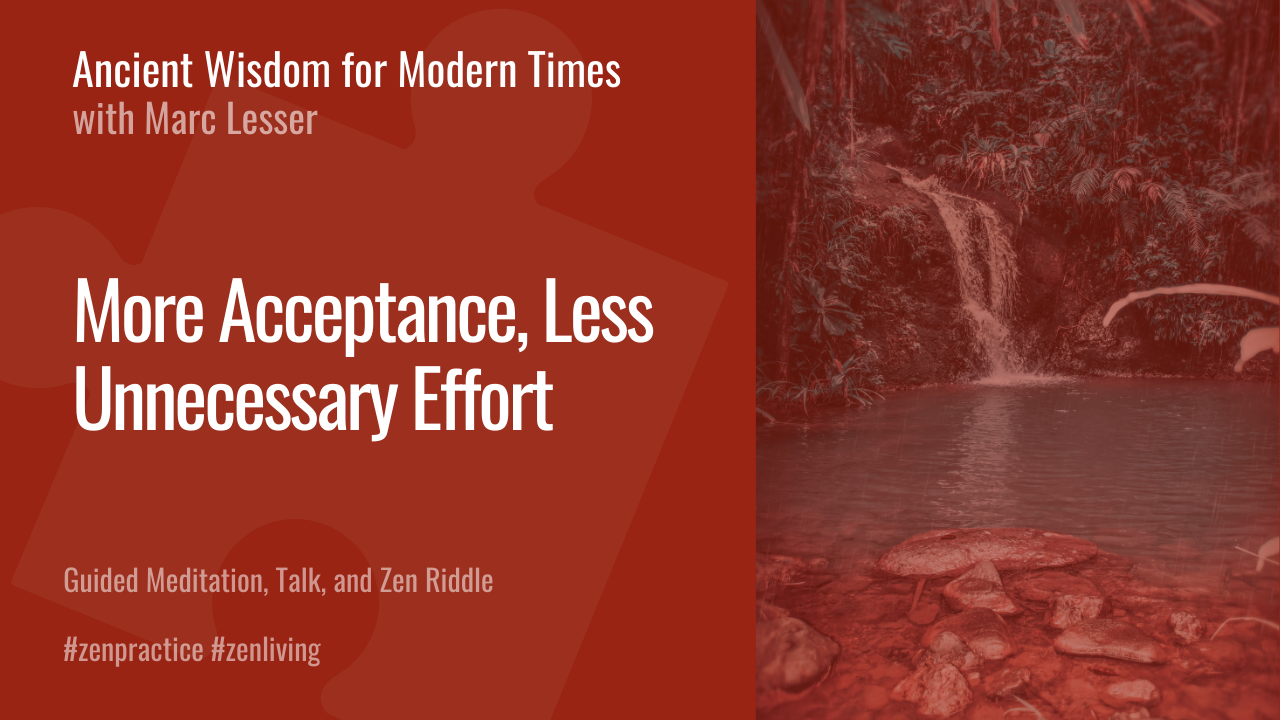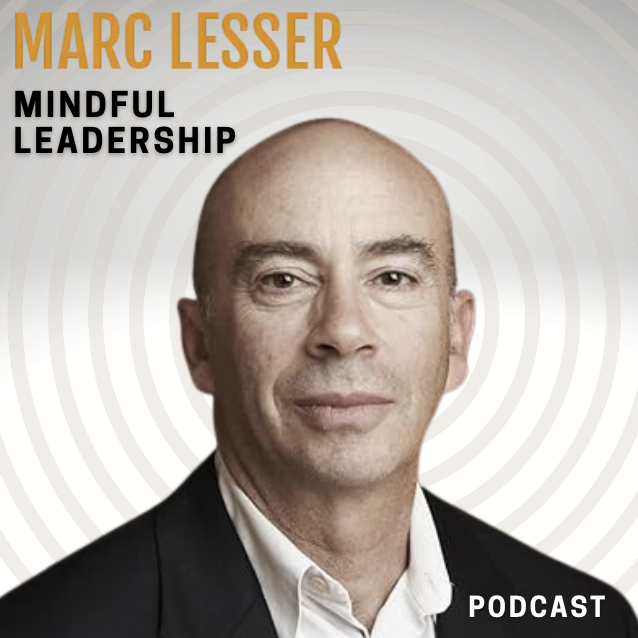This episode is More Acceptance and Less Unnecessary Effort. We begin with a short guided meditation, followed by a talk on the practice of saying yes – opening and accepting whatever comes our way. It means noticing and saying yes to the pains and possibilities, our resistance and our joy.
Today’s Zen puzzler is based on a traditional Zen dialogue. What is the Way? Everyday mind is the way.
EPISODE TRANSCRIPT
Marc Lesser: Welcome to Zen Bones. This is Marc Lesser. Zen Bones is a bi-weekly podcast featuring conversations with leading teachers and activists and an exploration of Zen teachings and practices. Please support our work by making a donation at Marclesser.net/donate.
[music]
How to Appreciate Your Life. We begin this episode with a short, guided meditation on the practice of confidence and humility. I then do a short talk based on one of my favorite talks by Shunryu Suzuki from Zen Mind, Beginners Mind that he calls Nirvana, the waterfall. A talk about a profound and accessible view of birth, life, and death. A way of practicing and contextualizing the meaning of our lives. Really, how to appreciate our lives. I use the same talk and image for today’s Zen puzzler about letting go of extra erroneous beliefs and patterns. I hope you enjoy today’s episode.
[music]
Let’s begin with a short sit. A short meditation together. [silence]
[bell rings]
Stopping and pausing. Seeing if it’s possible to be still. Having the body as still as you can. Such a simple, profound practice. I think especially these days, where we seem to be, many of us are doing a lot. Just a few minutes of stillness. A few moments of not doing anything other than just being here. Bringing awareness, bringing attention to here. The body, the breath. Using the breath as an anchor. Allowing breathing to be full, unrestricted, fluid. Noticing a thinking mind. Allowing thoughts. Thoughts may come and go, of course, but gently letting them go and coming back to the breath, to the body.
This sense, this sense of being still, it takes some awareness. A sense of cultivating a deep feeling of confidence. Confidence, humility, without any real effort. Just letting go. Letting go of the usual judgments, comparisons. No worries. No worries at all about doing it right or wrong or better or worse. Letting go of the success and failure. Instead, here with stillness. Warm-hearted stillness. Warm-hearted curiosity. What is it like right now to be here? Breathing, being breathed really, alive? This practice of studying the self and letting go. Going beyond the usual ego concerns and comparisons.
Embracing ourself and letting go is a practice of deep confidence. Nothing to improve or attain, just this ordinary mind. Ordinary mind is the way right now. [silence] Keeping it simple. Breathing in. I know that I’m breathing in, and I’m breathing out. I know that I am breathing out. Breathing in, I can feel my own confidence, and breathing out, I feel my own humility. Not knowing what will happen next yet, and yet just here. Please feel free to continue this sitting practice. I’m going to ring the bell and move on.
[bell rings]
[music]
I’d like to talk about the practice of how to fully enjoy our lives with an emphasis on unpacking and using one of my favorite talks from Zen Mind, Beginner’s Mind. A collection of talks by a Zen teacher, Shunryu Suzuki, the founder of the San Francisco Zen Center, who I consider my root teacher, although I never met him. I came to the San Francisco Zen Center a few years after he died. His teaching, so permeates, I think, many years that I spent that I lived at the Zen Center and that I’ve been practicing. This particular talk is called Nirvana, the Waterfall.
It has these lines in it, “Your everyday life will be renewed without being attached to an old erroneous interpretation of life.” When you realize this fact, you will discover how meaningless your old interpretation was and how much useless effort you had been making. You will find the true meaning of life. It just blows me away. Suzuki Roshi’s teaching and language. It’s so, I think, accessible, profound, important. In this talk, he also says, “You have difficulty because you have feeling. You attach to the feeling without knowing just how this feeling is created. When you don’t realize that you are one with the river or one with the universe.
You have fear. Whether it is separated into drops or not, water is water. Our life and death are the same thing. When we realize this fact, we have no fear of death anymore and have no actual difficulty in our life.” These are two passages from this talk. To back up a bit, he’s describing in this particular talk going to Yosemite and watching Yosemite Falls, and he has this insight as he’s watching the waterfall, and he notices that at the top of this waterfall is the stream and that he is describing that this stream represents our lives before we are born. He uses the metaphor that our lives are like the time of the water coming out of this fall, out of the stream, out of oneness, and that we become these separate drops.
He says, “I thought it must be a very difficult experience for each drop of water to come down from the top of such a high mountain. It takes time, a long time for the water to reach the bottom of the waterfall. It seems to me that our human life may be like this. We have many difficult experiences in our life, but at the same time, I thought it was not originally separated but was one whole river.” Only when it is separated does it have some difficulty in falling. Yes, so before we were born, we had no feeling. We were one with the universe. This is called mind only or essence of mind or big mind.
After we’re separated by birth from this oneness, as the water falling from the waterfall is separated, separated by the wind and the rocks, then we have feeling. He goes on again repeating this, that, “It is because we have feeling that we attach to this feeling, that we lose the memory, the body sense of our oneness with the river, and that at the same time, we are separated into drops, but we’re also one with this river.” Then he says, “When the water returns to its original oneness with the river, it no longer has any individual feeling to it. It resumes its own nature and this is a composure. How very glad the water must be to come back to the original river.”
If this is so, what feeling will we have upon our death? This is the true, perfect composure. He says that to talk about this understanding is quite easy but to have the actual feeling of this oneness, this sense that we are part of the river before we are born, during this lifetime the mirage of our separateness, and then the sense that when we die that we will return to this river. I’ve read this passage many times during memorial services or funerals. When you can sit with your whole body and mind and with the oneness of your mind and body, with a universal mind, you can easily attain the right understanding.
Your everyday life will be renewed without being attached to an old erroneous interpretation of life. When you realize this fact, you will discover how meaningless your old interpretation was. Interesting. I think we all have our own interpretation of how we see our birth and our life and death even if we haven’t articulated it. Here he’s articulating a particular view, painting a picture of reality from the perspective of Zen mind or big mind or the mind of great generosity. The sense that understanding our feelings and seeing, this is where a Zen practiced, what’s called emotional intelligence.
Emotional intelligence is really the study of our feelings and noticing the relationship between our thinking and our thoughts and our feelings and how they all seem so automatic. Suzuki, I think, is suggesting through this new interpretation of a birth and life and death, it gives us a little bit of space in not seeing how we create our worlds better, helping us understand our feelings and our thoughts and our emotions from this perspective of cultivating a greater sense of freedom. Of fully feeling what we’re feeling and not being tossed around or thrown into the usual dramas of our feelings and life, but instead feeling it without the usual attachment, without the usual drama.
When the water returns to its original oneness with the river it no longer has any individual feeling. It resumes its own nature and finds composure. Our practice is to aspire to find this sense of composure, this real deep sense of oneness composure and to use it to cultivate our own compassion from this place, from this letting go of our erroneous beliefs and assumptions. We then have the ability to help others to whip through our presence, words, deeds, and actions. When you can sit with a whole body and mind, and with the oneness of your mind and body, with a universal mind, you can attain the right understanding.
Your everyday life will be renewed without being attached to an old erroneous interpretation of life. When you realize this fact, you will discover the meaninglessness of your old interpretation and how much useless effort you had been making. Together let go of that useless effort and see through that old interpretations of our life and feel this profound sense of being safe, satisfied, and connected. Thank you very much.
[music]
Welcome to the Zen Bones puzzler, where I will regularly be presenting a story or a Zen poem or a poem, something to contemplate, to think about. A story that has purpose. It’s about developing greater insight and reflection. Not so much for a solution, but as a way to support your practice. A kind of meditation in daily life.
[gong dings]
Always makes me happy to introduce this Zen puzzler, kind of a lighthearted way of using and building on, and playing with traditional and non-traditional Zen koans. I think Zen koans are what I’m calling Zen puzzlers, are meant to be a way to help us integrate practice. Really the core of Zen practice, the core teaching, the core practice, is meditation is sitting still and learning about our own bodies, minds, feelings, and thoughts. Then the other core Zen practice is integration. How we take what the material, the lessons, the learnings, the challenges and opportunities that comes up, while we’re being still, and how we integrate, how we take this into all parts of our lives.
Seeing that everything is a cauldron for practice. Then taking that into our meditation practice. For today’s Zen puzzler, I want to return to the subject of the talk of Nirvana, the Waterfall, because I think it is a beautiful Zen koan, Zen story, worthy of staying within and using as an integration. The practice would be to feel our own sense of oneness that we all come from the same stream, we all return to the same stream, the stream of life. That seeing that this short time that we are here alive on this planet. It’s like being the feeling, the seeing deeply this sense of it’s just we are temporarily separate and we temporarily have feeling.
Using this image, using this koan, this teaching, as a way of feeling the profound sense of connectedness and oneness, and knowing that we can use this image, this explanation to let go of the erroneous and mistaken beliefs that we have about being separate. The erroneous and mistaken beliefs that we have about our feelings and emotions. Instead to be just super curious about the stories that we’re telling ourselves and to come back to this image and this teaching of the waterfall. I love his words, Shunryu Suzuki’s words, that your everyday life will be renewed without being attached to an erroneous interpretation of life. Letting go of useless effort and finding composure, finding the true meaning in our lives. Thank you very much.
[music]
I hope you’ve appreciated today’s episode. To learn more about my work and my new book, Finding Clarity, you can visit Marklesser.net. This podcast is offered freely and relies on financial support from listeners like you. Please donate@Marklesser.net/donate. Thank you very much.
[music]
[00:24:31] [END OF AUDIO]









